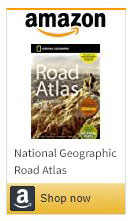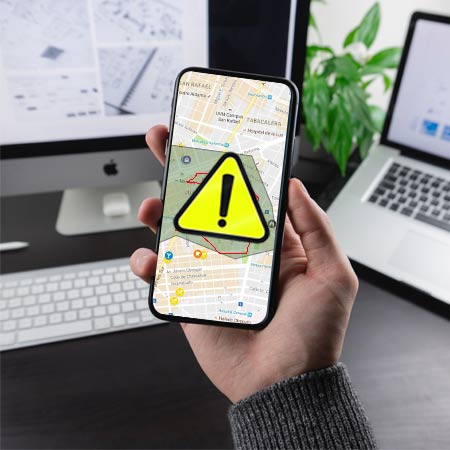I've enjoyed eight great years of interaction with thousands of other small travel trailer owners. Thanks for all your support, and hopefully a few of us will meet again somewhere in the woods or on the road! - Denny
Should you really use GPS when traveling?
Of course you should! I for one am as dependent upon using a GPS app on my cellphone, as I am on using Google! Even around town at home, I depend upon it to alert me of traffic problems and of course to "recalculate" whenever I miss a turn. When traveling, I depend on it for the same reasons. But is using GPS when traveling the best solution?
Being my age and having traveled all my life, it's hard to believe, but I can't imagine traveling without a GPS app any more. However, it has some significant limitations when taking trips. I first realized this in a significant way a few years ago when we took our big cross-country trip (see Cross Country Trip (Day 1) – Goodbye Florida! if you'd like to learn all about it). We ran into a few problems we hadn't prepared for.

The first problem using GPS when traveling
The first issue we ran into was the need to see a bigger picture. This is a problem we run into on most of our longer trips, and even shorter ones when we are going somewhere new. With the GPS, we have two main options. Take the shortest route, or take the shortest route that avoids highways. As I've written about before (Enjoy Your Drive and Avoid the Highways), we try to avoid highways all we can, but the shortest "avoid highways" route that the GPS chooses is not always the best one.
When setting the GPS to avoid highways, it will often take us on roads that aren't intended for people on a trip pulling a trailer. I remember one time when we were routed through a big neighborhood. It took us on several residential streets, a couple that were pretty narrow with cars parked curbside. After checking Google maps, I found that it saved us two minutes over having just stayed on some main roads. Other times, our GPS has routed us through the center of a town or city, when there was an easy way to bypass it by spending just a few more minutes. When you consider traffic and stop lights, the bypass route may often be just as fast.
A bigger problem using GPS when traveling
The biggest frustration we've had with GPS has been when traveling through the mountains. At times we've been where we would lose cell coverage for quite a while. The way the GPS works, is that it pre-loads maps for where it thinks you are headed when it has cell coverage. Most of the time this works fine. But should you make a turn that takes you off the planned route, or sometimes even if you are just without signal for too long (this happened to us a couple of times out west), GPS just doesn't know where you are or able to tell you where you should go.

Introducing: Old Fashioned Maps
The answer is easy and inexpensive! We found that carrying a paper map with us when we travel is invaluable. It's the perfect solution for finding alternatives to what the GPS suggests, as well as figuring out where we are and where we're going if the GPS loses signal.
We started out thinking we'd collect state maps from the Welcome Centers when we enter a new state, but that has a few problems. First, we may be crossing into a new state after hours. More commonly for us though, is that all the Welcome Centers are on the Interstates...which we try to avoid. Also, sometimes we need a map for a state we haven't gotten to yet.

A Better Solution
So, we found a better solution...an atlas! With maps for each state, this has been a great solution.
We started with a free atlas from our insurance agent. It worked well, but after a few trips, the covers were getting torn up from shoving them in the pouch behind my seat. I taped it up, but it also started to get some of the pages torn before too long.

Our Favorite Solution
If you don't have a good atlas and are interested in one, this is the best solution we've found so far. Not only is it a great collection of maps, it also has highlights of 100 interesting places across the U.S., as well as information on all the U.S. National Parks. There have been a few times that this additional information actually caused us to change our route a bit.
But still, the most important thing is that it contains a good set of maps. While the additional information is all focused on the U.S., it also contains maps of Canada and Mexico. The thing I really like though, is that unlike the free atlas from our insurance agent, the one we now have features heavy duty spiral binding and clear plastic covers for durability and complete fold-back to any page. It has held up well, and is much easier to handle while in the car.
We love this particular atlas. If you'd like to check it out yourself or read other people's reviews, follow the link to find it on Amazon. As always, drop me a note if you have questions.
- Denny

Are you a newbie?
If you are new to the world of Small Travel Trailers, here are the three most popular things for most newbies, here on my website. Please check them out and see if they aren't helpful to you:
- RV Surge Suppressors – What you need to know.
It's really important that you understand the risks and know how to protect yourself against bad electrical problems. Not only can these they cause a lot of damage to your trailer and electronic components, they can also be dangerous. - A list of products we use and like.
All the camping and RV accessories can be overwhelming when you're first getting started. After trying lots of things, these are the items that have really worked well for us. The list may save you a few bucks on buying something you don't like or stuff you'll never use (I don't publish my long list of things we've purchased and wish we hadn't!). - My free Beginner's Guide to Small Travel Trailers
Over 100 pages, this guide is all about what we've learned since we got started owning and traveling with a small travel trailer.

Denny Johnson
After having spent most of our adult life in Orlando, my wife Fay and I moved to Knoxville, TN in 2020. We are loving the change of seasons and being near the mountains. Plus, this part of the country is loaded with great places to camp.We camped years ago with a pop-up camper, but got serious about it when we purchased our Casita in 2014. There was a lot to learn as we started traveling with it, and a lot of conflicting opinions on line. That's when I decided that creating a website would be a good retirement project. I started tinyTowable.com to share things we've learned along the way that have worked well for us in hopes that the information would be of help to others.
However, since moving to Tennessee, I've gotten involved with new hobbies (you can check some out on my personal website at https://www.softrite.com) and we haven't camped very much. So, at the end of 2023, I made the tough decision to stop updating this website.





11 thoughts on “The problems using GPS when traveling with a small travel trailer”
My craziest experience with a GPS was when I was trying to get to an RV park. The road went from four-lane to two-lane to one-lane to dirt road. Then the GPS said, “park your vehicle and walk the rest of the way.” I don’t think so. Turning around was a hoot.
WendyW..
Ha! Never ran into anything that crazy, but I can believe it.
I had a horrific experience in Tennessee a couple of years back, blithely following my GPS down a twisting mountain road that clearly was not designed for even a small T@B like mine… I wrote about it and really wished I had turned on my video camera to capture the hairpin turns. https://theredwriterwrites.blogspot.com/2019/05/descending-matterhorn-in-red-writer.html
Number of years ago we did a trip to the Pacific Northwest. Rained the entire week. We had a base model Garmin that were fairly new at the time. We had a class C pulling a Smart Car. In one downpour we were directed to a dead end street by a Church. No way to back up or turn around only choice was to unhook in the down pour. That was the last time I depended on any GPS! (Still enjoyed the trip, and still love RVs!)
I just returned from a coast-to-coast trip with my new, (old), Small World trailer, from San Jose, CA, to Connecticut. I used a combination of GPS and paper maps.
I wish there was a good map program for GPS that would include things like elevation changes and alternatives to Interstate Highways. Out West, there are often many state roads and secondary roads that are just as good as the highways but don’t have the truck traffic and billboards. These are my preferred routes.
Some map apps allow you to change your route by dragging the blue line which designates the route onto other roads, thereby changing the route by choice. Sometimes this works, sometimes it doesn’t. I guess it’s all part of the trip!
Definitely agree John. In fact, here’s the link to an article I wrote all about how and why we avoid the Interstates…https://tinytowable.com/avoid-highways-2/
We also. know that GPS alone doesn’t work for us because we prefer to avoid the higher speeds and ‘truck wakes’ on Interstates and other freeways/expressways. I even tried AAA Triptiks, but the only option they have to avoid Interstates, also avoids any ‘highways’, which sometimes is good and sometimes leaves us on what my partner calls ‘goat paths’. Someone needs to create a route planning that avoids limited access routes, like Interstates.
Denny just going to take a moment to drive home the point that those settings are everything when towing a trailer or not. Up in Oregon we have lost three people just to the fact that they had quickest route picked. This was in the winter months which directed them to go up and over seasonal roads which are covered with snow in the winter. In one case the wife and baby survived but he perished walking off for help. So just to point out those settings can literally be life and death decisions not to be taken lightly. Appreciate all the information that you put on here Denny!!
Wow, that’s very sad Bob. Just one more reason to check a map and use some discretion regarding your routes when using GPS.
We just got done with a trip to Lincoln SP in southern Indiana, with a stop at Prophetstown SP near Lafayette, IN. The biggest problem we had on this trip was road construction, with 25 mile detours to get 3 miles down the road. I wasted a half tank of gas and spent 2 extra hours driving than what Google Maps claimed.
Your right about that Lee. I actually wrote an article about it a few months ago.
https://tinytowable.com/interstates/
– Denny